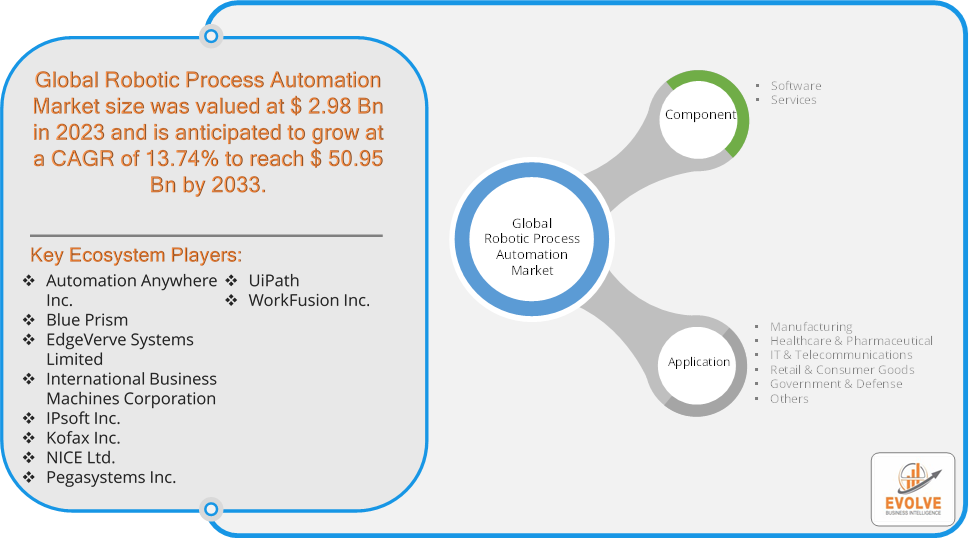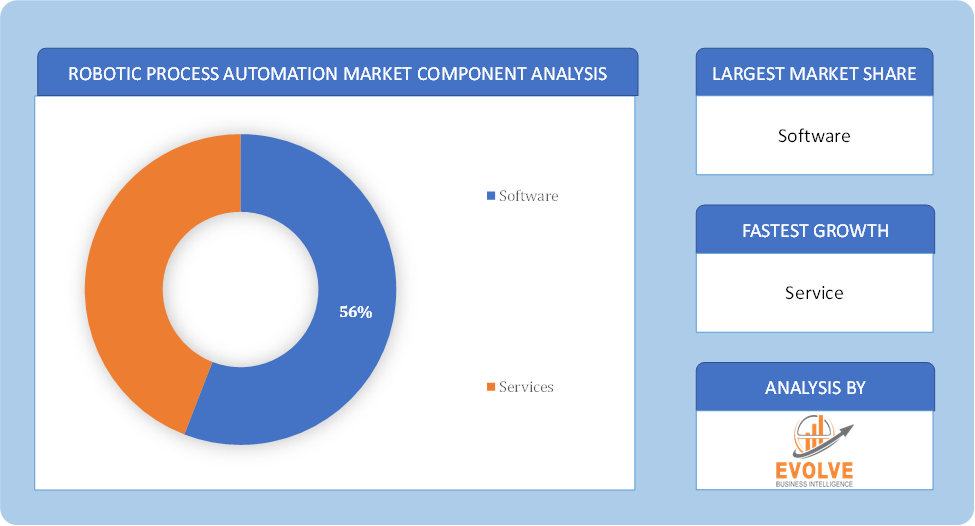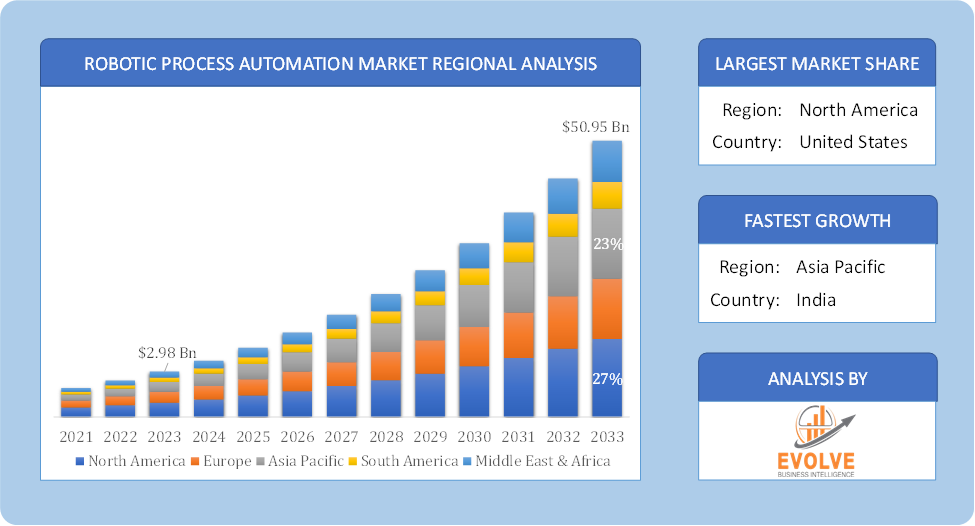Robotic Process Automation Market Analysis and Global Forecast 2023-2033
$ 1,390.00 – $ 5,520.00Price range: $ 1,390.00 through $ 5,520.00
Robotic Process Automation Market Research Report: Information By Component (Software, Services), By Application (Manufacturing, Healthcare & Pharmaceutical, IT & Telecommunications, Retail & Consumer Goods, Government & Defense, Others), and by Region — Forecast till 2033
Page: 116
Robotic Process Automation Market Overview
The Robotic Process Automation Market Size is expected to reach USD 50.95 Billion by 2033. The Robotic Process Automation Market industry size accounted for USD 2.98 Billion in 2023 and is expected to expand at a compound annual growth rate (CAGR) of 13.74% from 2023 to 2033. The Robotic Process Automation (RPA) Market refers to the industry segment focused on technologies and solutions that enable the automation of repetitive, rule-based tasks within business processes using software robots or “bots.” RPA tools mimic human actions to interact with digital systems and applications, allowing organizations to automate tasks such as data entry, processing transactions, and generating reports.
The RPA market is expanding rapidly as more organizations recognize the benefits of automating routine tasks to focus on more strategic activities. The RPA market is experiencing significant growth due to the benefits it offers to organizations. As technology continues to advance, we can expect to see even more innovative RPA solutions and broader adoption across various industries.
Global Robotic Process Automation Market Synopsis
The COVID-19 pandemic had a significant impact on the Robotic Process Automation (RPA) market. The pandemic accelerated the adoption of RPA as organizations sought to adapt to remote work and maintain business continuity. RPA proved valuable in automating repetitive tasks, reducing the need for physical presence, and managing increased workloads during periods of disruption. The shift to remote work led to increased reliance on technology to support distributed teams. RPA helped organizations manage processes remotely and ensure continuity of operations despite physical distancing requirements. The pandemic accelerated the integration of RPA with AI and machine learning technologies. Organizations began exploring advanced automation solutions that could handle more complex tasks and make data-driven decisions. Some organizations faced challenges in implementing RPA due to rapid changes in business requirements and priorities. Ensuring proper integration with existing systems and managing change became critical factors in successful RPA adoption.
Robotic Process Automation Market Dynamics
The major factors that have impacted the growth of Robotic Process Automation Market are as follows:
Drivers:
Ø Advancements in AI and Machine Learning
The integration of RPA with AI and machine learning technologies allows for more sophisticated automation capabilities, such as handling complex tasks and making data-driven decisions. RPA solutions offer scalability, allowing businesses to easily adjust the level of automation according to changing needs and workloads. This flexibility is particularly valuable in dynamic and fast-paced environments. The growing adoption of cloud computing facilitates the deployment and management of RPA solutions, providing businesses with scalable and cost-effective automation options.
Restraint:
- Perception of High Implementation Costs and Complexity in Integration
Initial setup and deployment of RPA systems can be expensive. Costs include software licenses, infrastructure, training, and change management, which may be a barrier for small and medium-sized enterprises (SMEs). Integrating RPA with existing legacy systems and business processes can be complex and challenging. Compatibility issues and the need for customization can delay implementation and increase costs.
Opportunity:
⮚ Cloud-Based RPA Solutions
The growing adoption of cloud computing provides an opportunity for the development of cloud-based RPA solutions. These solutions offer scalability, flexibility, and reduced infrastructure costs, making them attractive to businesses of all sizes. The rise of RPA-as-a-Service offers businesses a subscription-based model for RPA deployment and management. This model lowers the barrier to entry by reducing upfront costs and providing access to advanced automation tools and expertise. Emerging markets are experiencing rapid digital transformation and technological adoption. There are opportunities to expand RPA solutions in these regions, where businesses are seeking to modernize and automate their operations.
Robotic Process Automation Market Segment Overview
Based on Component, the market is segmented based on Software and Services. The services segment dominates the market. The need for RPA as a service is fueled by regular improvements in automation services that offer great scalability and reduce cost. RPA software also makes it possible for businesses to operate more efficiently and reduces cost with quick automation of manual and back-office tasks.
By Application
Based on Application, the market segment has been divided into Manufacturing, Healthcare & Pharmaceutical, IT & Telecommunications, Retail & Consumer Goods, Government & Defense and Others. The Retail & consumer goods segment dominant the market. Robotic process automation is widely used in retail and ecommerce sectors for improving customer service, and faster order fulfilment procedures. RPA assists enterprises in enhancing the inventory management, customer support functions and order processing, resulting in saving time and resources for them.
Global Robotic Process Automation Market Regional Analysis
Based on region, the global Robotic Process Automation Market has been divided into North America, Europe, Asia-Pacific, the Middle East & Africa, and Latin America. North America is projected to dominate the use of the Robotic Process Automation Market followed by the Asia-Pacific and Europe regions.
 Robotic Process Automation North America Market
Robotic Process Automation North America Market
North America holds a dominant position in the Robotic Process Automation Market. North America, particularly the United States, has been a pioneer in RPA adoption, driven by factors such as a mature IT infrastructure, high labor costs, and a strong focus on process optimization. The United States and Canada are key players in the North American RPA market and Advanced RPA implementations, integration with AI and machine learning, and a focus on enhancing operational efficiency across various industries such as finance, healthcare, and manufacturing.
Robotic Process Automation Asia-Pacific Market
The Asia-Pacific region has indeed emerged as the fastest-growing market for the Robotic Process Automation Market industry. Rapid adoption in emerging economies, focus on cost reduction and operational efficiency, and growth in sectors such as banking, finance, and telecommunications and expansion of RPA solutions in SMEs, development of local RPA vendors, and increasing adoption in sectors like manufacturing and retail.
Competitive Landscape
The global Robotic Process Automation Market is highly competitive, with numerous players offering a wide range of software solutions. The competitive landscape is characterized by the presence of established companies, as well as emerging startups and niche players. To increase their market position and attract a wide consumer base, the businesses are employing various strategies, such as product launches, and strategic alliances.
Prominent Players:
- Automation Anywhere Inc.
- Blue Prism
- EdgeVerve Systems Limited
- International Business Machines Corporation
- IPsoft Inc.
- Kofax Inc.
- NICE Ltd.
- Pegasystems Inc.
- UiPath
- WorkFusion Inc.
Scope of the Report
Global Robotic Process Automation Market, by Component
- Software
- Services
Global Robotic Process Automation Market, by Application
- Manufacturing
- Healthcare & Pharmaceutical
- IT & Telecommunications
- Retail & Consumer Goods
- Government & Defense
- Others
Global Robotic Process Automation Market, by Region
- North America
- US
- Canada
- Mexico
- Europe
- UK
- Germany
- France
- Italy
- Spain
- Benelux
- Nordic
- Rest of Europe
- Asia Pacific
- China
- Japan
- South Korea
- Indonesia
- Austalia
- Malaysia
- India
- Rest of Asia Pacific
- South America
- Brazil
- Argentina
- Rest of South America
- Middle East & Africa
- Saudi Arabia
- UAE
- Egypt
- South Africa
- Rest of Middle East & Africa
| Parameters | Indicators |
|---|---|
| Market Size | 2033: USD 50.95 Billion |
| CAGR (2023-2033) | 13.74% |
| Base year | 2022 |
| Forecast Period | 2023-2033 |
| Historical Data | 2021 (2017 to 2020 On Demand) |
| Report Coverage | Revenue Forecast, Competitive Landscape, Growth Factors, and Trends |
| Key Segmentations | Component, Application |
| Geographies Covered | North America, Europe, Asia-Pacific, South America, Middle East, Africa |
| Key Vendors | Automation Anywhere Inc., Blue Prism, EdgeVerve Systems Limited, International Business Machines Corporation, IPsoft Inc., Kofax Inc., NICE Ltd., Pegasystems Inc., UiPath and WorkFusion Inc. |
| Key Market Opportunities | · Cloud-Based RPA Solutions · Robotic Process Automation in Emerging Markets |
| Key Market Drivers | · Advancements in AI and Machine Learning · Integration with Cloud Technologies |
REPORT CONTENT BRIEF:
- High-level analysis of the current and future Robotic Process Automation Market trends and opportunities
- Detailed analysis of current market drivers, restraining factors, and opportunities in the future
- Robotic Process Automation Market historical market size for the year 2021, and forecast from 2023 to 2033
- Robotic Process Automation Market share analysis at each product level
- Competitor analysis with detailed insight into its product segment, Government & Defense strength, and strategies adopted.
- Identifies key strategies adopted including product launches and developments, mergers and acquisitions, joint ventures, collaborations, and partnerships as well as funding taken and investment done, among others.
- To identify and understand the various factors involved in the global Robotic Process Automation Market affected by the pandemic
- To provide a detailed insight into the major companies operating in the market. The profiling will include the Government & Defense health of the company’s past 2-3 years with segmental and regional revenue breakup, product offering, recent developments, SWOT analysis, and key strategies.
Frequently Asked Questions (FAQ)
What is the study period of this market?
The study period of the global Robotic Process Automation Market is 2021- 2033
What is the growth rate of the global Robotic Process Automation Market?
The global Robotic Process Automation Market is growing at a CAGR of 13.74% over the next 10 years
Which region has the highest growth rate in the market of Robotic Process Automation Market?
Asia Pacific is expected to register the highest CAGR during 2023-2033
Which region has the largest share of the global Robotic Process Automation Market?
North America holds the largest share in 2022
Who are the key players in the global Robotic Process Automation Market?
Automation Anywhere, Inc., Blue Prism, EdgeVerve Systems Limited, International Business Machines Corporation, IPsoft Inc., Kofax Inc., NICE Ltd., Pegasystems Inc., UiPath and WorkFusion, Inc. are the major companies operating in the market.
Do you offer Post Sale Support?
Yes, we offer 16 hours of analyst support to solve the queries
Do you sell particular sections of a report?
Yes, we provide regional as well as country-level reports. Other than this we also provide a sectional report. Please get in contact with our sales representatives.
Press Release

Global Pharmaceutical Manufacturing Market to Reach $1.38 Trillion by 2035 with 7.35% CAGR, New Research Shows

The Global Mammography Market Is Estimated To Record a CAGR of Around 10.29% During The Forecast Period

Glue Stick Market to Reach USD 2.35 Billion by 2034

Podiatry Service Market to Reach USD 11.88 Billion by 2034

Microfluidics Technology Market to Reach USD 32.58 Billion by 2034

Ferric Chloride Market to Reach USD 10.65 Billion by 2034

Family Practice EMR Software Market to Reach USD 21.52 Billion by 2034

Electric Hairbrush Market to Reach USD 15.95 Billion by 2034

Daily Bamboo Products Market to Reach USD 143.52 Billion by 2034

Cross-border E-commerce Logistics Market to Reach USD 112.65 Billion by 2034
Table of Content
Chapter 1. Executive Summary Chapter 2. Scope Of The Study 2.1. Market Definition 2.2. Scope Of The Study 2.2.1. Objectives of Report 2.2.2. Limitations 2.3. Market Structure Chapter 3. Evolve BI Methodology Chapter 4. Market Insights and Trends 4.1. Supply/ Value Chain Analysis 4.1.1. Raw End Users Providers 4.1.2. Manufacturing Process 4.1.3. Distributors/Retailers 4.1.4. End-Use Industry 4.2. Porter’s Five Forces Analysis 4.2.1. Threat Of New Entrants 4.2.2. Bargaining Power Of Buyers 4.2.3. Bargaining Power Of Suppliers 4.2.4. Threat Of Substitutes 4.2.5. Industry Rivalry 4.3. Impact Of COVID-19 on the Robotic Process Automation Market 4.3.1. Impact on Market Size 4.3.2. End-Use Industry Trend, Preferences, and Budget Impact 4.3.3. Regulatory Framework/Government Policies 4.3.4. Key Players' Strategy to Tackle Negative Impact 4.3.5. Opportunity Window 4.4. Technology Overview 12.28. Macro factor 4.6. Micro Factor 4.7. Demand Supply Gap Analysis of the Robotic Process Automation Market 4.8. Import Analysis of the Robotic Process Automation Market 4.9. Export Analysis of the Robotic Process Automation Market Chapter 5. Market Dynamics 5.1. Introduction 5.2. DROC Analysis 5.2.1. Drivers 5.2.2. Restraints 5.2.3. Opportunities 5.2.4. Challenges 5.3. Patent Analysis 5.4. Industry Roadmap 5.5. Parent/Peer Market Analysis Chapter 6. Global Robotic Process Automation Market, By Component 6.1. Introduction 6.2. Software 6.3. Services. Chapter 7. Global Robotic Process Automation Market, By Application 7.1. Introduction 7.2. Manufacturing 7.3. Healthcare & Pharmaceutical 7.4. IT & Telecommunications 7.5. Retail & Consumer Goods 7.6. Government & Defense 7.7. Others Chapter 8. Global Robotic Process Automation Market, By Region 8.1. Introduction 8.2. North America 8.2.1. Introduction 8.2.2. Driving Factors, Opportunity Analyzed, and Key Trends 8.2.3. Market Size and Forecast, By Country, 2023-2033 8.2.4. Market Size and Forecast, By Product Type, 2023-2033 8.2.5. Market Size and Forecast, By End User, 2023-2033 8.2.6. US 8.2.6.1. Introduction 8.2.6.2. Driving Factors, Opportunity Analyzed, and Key Trends 8.2.6.3. Market Size and Forecast, By Product Type, 2023-2033 8.2.6.4. Market Size and Forecast, By End User, 2023-2033 8.2.7. Canada 8.2.7.1. Introduction 8.2.7.2. Driving Factors, Opportunity Analyzed, and Key Trends 8.2.7.4. Market Size and Forecast, By Product Type, 2023-2033 8.2.7.5. Market Size and Forecast, By End User, 2023-2033 8.3. Europe 8.3.1. Introduction 8.3.2. Driving Factors, Opportunity Analyzed, and Key Trends 8.3.3. Market Size and Forecast, By Country, 2023-2033 8.3.4. Market Size and Forecast, By Product Type, 2023-2033 8.3.5. Market Size and Forecast, By End User, 2023-2033 8.3.6. Germany 8.3.6.1. Introduction 8.3.6.2. Driving Factors, Opportunity Analyzed, and Key Trends 8.3.6.3. Market Size and Forecast, By Product Type, 2023-2033 8.3.6.4. Market Size and Forecast, By End User, 2023-2033 8.3.7. France 8.3.7.1. Introduction 8.3.7.2. Driving Factors, Opportunity Analyzed, and Key Trends 8.3.7.3. Market Size and Forecast, By Product Type, 2023-2033 8.3.7.4. Market Size and Forecast, By End User, 2023-2033 8.3.8. UK 8.3.8.1. Introduction 8.3.8.2. Driving Factors, Opportunity Analyzed, and Key Trends 8.3.8.3. Market Size and Forecast, By Product Type, 2023-2033 8.3.8.4. Market Size and Forecast, By End User, 2023-2033 8.3.9. Italy 8.3.9.1. Introduction 8.3.9.2. Driving Factors, Opportunity Analyzed, and Key Trends 8.3.9.3. Market Size and Forecast, By Product Type, 2023-2033 8.3.9.4. Market Size and Forecast, By End User, 2023-2033 8.3.11. Rest Of Europe 8.3.11.1. Introduction 8.3.11.2. Driving Factors, Opportunity Analyzed, and Key Trends 8.3.11.3. Market Size and Forecast, By Product Type, 2023-2033 8.3.11.4. Market Size and Forecast, By End User, 2023-2033 8.4. Asia-Pacific 8.4.1. Introduction 8.4.2. Driving Factors, Opportunity Analyzed, and Key Trends 8.4.3. Market Size and Forecast, By Country, 2023-2033 8.4.4. Market Size and Forecast, By Product Type, 2023-2033 8.12.28. Market Size and Forecast, By End User, 2023-2033 8.4.6. China 8.4.6.1. Introduction 8.4.6.2. Driving Factors, Opportunity Analyzed, and Key Trends 8.4.6.3. Market Size and Forecast, By Product Type, 2023-2033 8.4.6.4. Market Size and Forecast, By End User, 2023-2033 8.4.7. India 8.4.7.1. Introduction 8.4.7.2. Driving Factors, Opportunity Analyzed, and Key Trends 8.4.7.3. Market Size and Forecast, By Product Type, 2023-2033 8.4.7.4. Market Size and Forecast, By End User, 2023-2033 8.4.8. Japan 8.4.8.1. Introduction 8.4.8.2. Driving Factors, Opportunity Analyzed, and Key Trends 8.4.8.3. Market Size and Forecast, By Product Type, 2023-2033 8.4.8.4. Market Size and Forecast, By End User, 2023-2033 8.4.9. South Korea 8.4.9.1. Introduction 8.4.9.2. Driving Factors, Opportunity Analyzed, and Key Trends 8.4.9.3. Market Size and Forecast, By Product Type, 2023-2033 8.4.9.4. Market Size and Forecast, By End User, 2023-2033 8.4.10. Rest Of Asia-Pacific 8.4.10.1. Introduction 8.4.10.2. Driving Factors, Opportunity Analyzed, and Key Trends 8.4.10.3. Market Size and Forecast, By Product Type, 2023-2033 8.4.10.4. Market Size and Forecast, By End User, 2023-2033 8.5. Rest Of The World (RoW) 8.5.1. Introduction 8.5.2. Driving Factors, Opportunity Analyzed, and Key Trends 8.5.3. Market Size and Forecast, By Product Type, 2023-2033 8.5.4. Market Size and Forecast, By End User, 2023-2033 Chapter 9. Company Landscape 9.1. Introduction 9.2. Vendor Share Analysis 9.3. Key Development Analysis 9.4. Competitor Dashboard Chapter 10. Company Profiles 10.1. Automation Anywhere Inc. 10.1.1. Business Overview 10.1.2. Government & Defense Analysis 10.1.2.1. Government & Defense – Existing/Funding 10.1.3. Product Portfolio 10.1.4. Recent Development and Strategies Adopted 10.1.5. SWOT Analysis 10.2. Blue Prism 10.2.1. Business Overview 10.2.2. Government & Defense Analysis 10.2.2.1. Government & Defense – Existing/Funding 10.2.3. Product Portfolio 10.2.4. Recent Development and Strategies Adopted 10.2.5. SWOT Analysis 10.3. EdgeVerve Systems Limited 10.3.1. Business Overview 10.3.2. Government & Defense Analysis 10.3.2.1. Government & Defense – Existing/Funding 10.3.3. Product Portfolio 10.3.4. Recent Development and Strategies Adopted 10.3.5. SWOT Analysis 10.4. International Business Machines Corporation 10.4.1. Business Overview 10.4.2. Government & Defense Analysis 10.4.2.1. Government & Defense – Existing/Funding 10.4.3. Product Portfolio 10.4.4. Recent Development and Strategies Adopted 10.12.28. SWOT Analysis 10.5. IPsoft Inc. 10.5.1. Business Overview 10.5.2. Government & Defense Analysis 10.5.2.1. Government & Defense – Existing/Funding 10.5.3. Product Portfolio 10.5.4. Recent Development and Strategies Adopted 10.5.5. SWOT Analysis 10.6. Kofax Inc. 10.6.1. Business Overview 10.6.2. Government & Defense Analysis 10.6.2.1. Government & Defense – Existing/Funding 10.6.3. Product Portfolio 10.6.4. Recent Development and Strategies Adopted 10.6.5. SWOT Analysis 10.7. NICE Ltd. 10.7.1. Business Overview 10.7.2. Government & Defense Analysis 10.7.2.1. Government & Defense – Existing/Funding 10.7.3. Product Portfolio 10.7.4. Recent Development and Strategies Adopted 10.7.5. SWOT Analysis 10.8 Pegasystems Inc. 10.8.1. Business Overview 10.8.2. Government & Defense Analysis 10.8.2.1. Government & Defense – Existing/Funding 10.8.3. Product Portfolio 10.8.4. Recent Development and Strategies Adopted 10.8.5. SWOT Analysis 10.9 UiPath 10.9.1. Business Overview 10.9.2. Government & Defense Analysis 10.9.2.1. Government & Defense – Existing/Funding 10.9.3. Product Portfolio 10.9.4. Recent Development and Strategies Adopted 10.9.5. SWOT Analysis 10.10. WorkFusion Inc. 10.10.1. Business Overview 10.10.2. Government & Defense Analysis 10.10.2.1. Government & Defense – Existing/Funding 10.10.3. Product Portfolio 10.10.4. Recent Development and Strategies Adopted 10.10.5. SWOT Analysis
Connect to Analyst
Research Methodology










